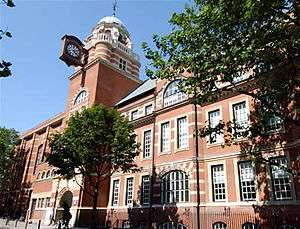Bar Professional Training Course

The Bar Professional Training Course or BPTC (previously known as Bar Vocational Course, or BVC) is a postgraduate course which allows law graduates to be named and practise as barristers in England and Wales. The thirteen institutes that run the BPTC along with the four prestigious Inns of Court are often collectively referred to as Bar School.
The BPTC is currently the most expensive legal course in Europe.[1] For the 2016-17 year, some of the London's colleges fees might exceed £20,000.[2][3]
This academic stage is the first of the three stages of legal education, the second being the vocational stage (the BPTC) and the third being the practical stage (pupillage). On successful completion of the vocational stage, which also involves completing twelve qualifying sessions, students are called to the Bar; however, only those who have successfully completed pupillage can work as barristers.[4][5]
Entry requirements
In addition to passing the Bar Course Aptitude Test (BCAT), the minimum entry requirements for the BPTC is qualifying a Bachelor of Laws with no less than lower second-class (2:2) honours or a non-law academic degree with lower second-class (2:2) honours alongside the Graduate Diploma in Law.[6]
Besides, applicants for the BPTC should also demonstrate excellent extracurricular activities. A suitable candidate has to provide strong evidence of a commitment to the English Bar. It is important for a candidate to have Common law, European law, Civil law and Criminal law reasoning as subjects during their course of studies as LLB students.[7]
Criticisms
In April 2015, Chair of the Bar Council Alastair Macdonald raised concerns about the financial risk involved in taking the BPTC, claiming that "There are too many people spending too much money in order to train [. . .] with no realistic prospect of being able to make a start in the profession. In the same month, a report commissioned by the Bar Council heavily criticised BPTC providers. The report suggested that course providers were "using the system to make money from people with no realistic prospect of pupillage," and claimed that the course was "not highly regarded by practitioners." The report suggested increasing standards for the course, and introducing a new test to replace the BCAT, which currently has a 98% pass rate, though there plans to increase the pass mark.[8][9] Jeremy Robson, a senior lecturer at Nottingham Law School, denied these claims. He noted that all prospective students receive a health warning noting the low number of pupillages compared to course places, and that the practitioners consulted in the working group were "drawn from a small section of the profession."[10]
Providers
| Institution | Location | Circuit | Approx. course fees | Report | Website |
|---|---|---|---|---|---|
| City Law School | London | South Eastern | £17,500 | Report | City |
| The University of Law | Birmingham, London, and Leeds | South Eastern | £18,500 | full-time – 1 year – September 2014 Report | ULaw |
| BPP Law School | London | South Eastern | £18,000 | Report | BPP |
| BPP Law School | Leeds | North Eastern | £13,785 | Report | BPP |
| BPP Law School | Manchester | Northern | £13,785 | Report | BPP |
| BPP Law School | Birmingham | Midland Circuit | TBC | BPP | |
| University of the West of England | Bristol | Western | £12,500 | Report | BILP |
| Cardiff University | Cardiff | Wales & Chester | £13,000(local) £15,000(International) | Report | Cardiff |
| Nottingham Trent University | Nottingham | Midland Circuit | £13,000 | Report | Nottingham |
| Manchester Metropolitan University | Manchester | Northern | £12,500 | Report | MMU |
| Northumbria University | Newcastle upon Tyne | North Eastern | £12,350 | Report | Northumbria |
See also
- Law Society of England and Wales
- Bar Council
- Barrister
- Inns of Court
- List of areas of law
- Bar Standards Board
References
- ↑ Fiona Cownie (2010). Stakeholders in the Law School. Hart Publishing. p. 267. ISBN 978-1841137216.
- ↑ "BPTC fees to increase again in 2015-16, while the Bar recruits fewer than 500 new barristers a year". LawCareers.net. 1 May 2015. Retrieved 16 May 2015.
- ↑ Lawyer 2B, 10 factors to consider when choosing a BPTC provider
- ↑ Adam Kramer (2007). Bewigged and Bewildered: Pupillage and a Career at the Bar. Hart Publishing. ISBN 1-84113-651-4.
- ↑ Croft, Janes (7 April 2015). "Bar weighs option of breaking up barristers' training". The Financial Times. Retrieved 14 August 2015.
- ↑ Entry Requirement, BPTC
- ↑ Gary Slapper and David Kelly (2013). The English Legal System. Routledge. p. 798. ISBN 978-0415639989.
- ↑ "Bar regulator announces changes to the Bar Course Aptitude Test for 2016 and 2017". Bar Standards Board. Retrieved 4 July 2016.
- ↑ Waller-Davies, Becky (13 April 2015). "Bar Council report slams BPTC providers". The Lawyer. Retrieved 26 August 2015.
- ↑ Robson, Jeremy (17 April 2015). "'Bar Council's attack on BPTC providers is wrong' - Nottingham Law School responds to Rivlin criticism". The Lawyer. Retrieved 26 August 2015.
External links
- Table of BPTC providers
- BPTC provider reports
- Chambers Student Guide: What is the BPTC?
- Lawyer 2B: 10 factors to consider when choosing a BPTC provider